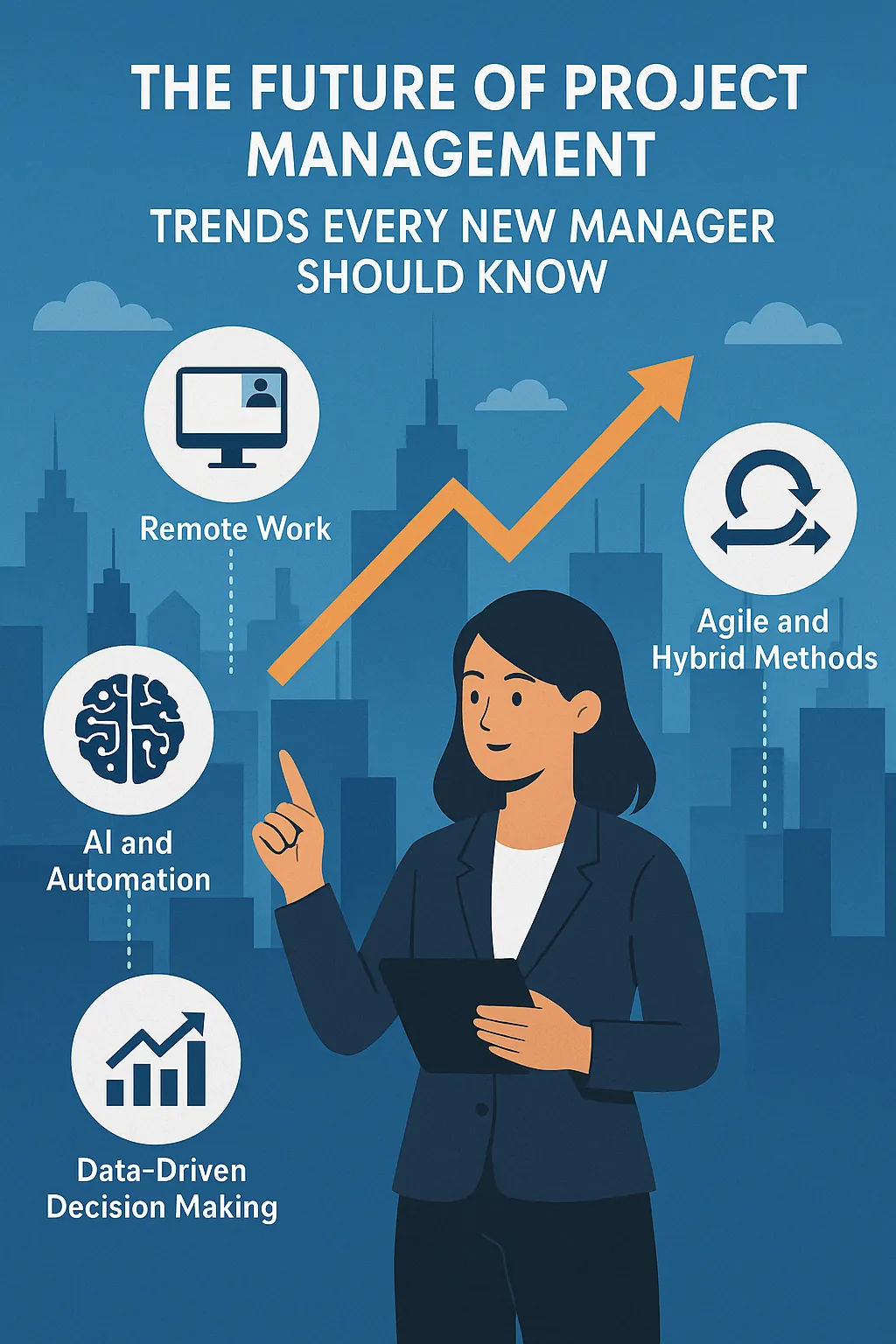Introduction: The Evolving Landscape of Project Management
Project management has become an essential discipline across various industries, serving as a backbone for successful project execution and delivery. As organizations increasingly rely on structured methodologies to achieve their goals, the role of project managers has expanded significantly. Here are some key points to consider regarding the evolving landscape of project management:
- Diverse Applications Across Industries: Project management is not confined to a single sector; it spans industries such as construction, IT, healthcare, finance, and marketing. Each of these fields requires project managers to oversee projects that range from product launches to infrastructure development, highlighting the versatility and necessity of project management skills in today’s job market [1].
- Adapting to New Trends for Career Advancement: The project management field is continuously evolving, influenced by technological advancements and changing business needs. For aspiring project managers, staying abreast of these trends is crucial for career growth. Understanding emerging tools, methodologies, and best practices can provide a competitive edge in the job market, especially for those entering the field without prior experience [2][9].
- Scope of Trends to be Discussed: This blog will explore several key trends shaping the future of project management, including the integration of artificial intelligence, the rise of automated project management tools, and the increasing importance of effective communication. Each of these trends not only impacts how projects are managed but also offers new opportunities for aspiring project managers to enhance their skills and adapt to the changing landscape [8][10].
By understanding these trends, new project managers can better position themselves for success in a dynamic environment, ensuring they are equipped to meet the challenges of modern project management head-on.
Trend 1: Agile Methodologies and Their Rise
Agile methodologies have emerged as a significant trend that aspiring project managers should understand. This section delves into the definition, core principles, benefits, and industry applications of Agile, highlighting its importance for those entering the field.
Definition and Core Principles of Agile
Agile is an umbrella term encompassing various methodologies and techniques that prioritize an iterative approach to project management. At its core, Agile emphasizes flexibility, collaboration, and customer feedback, allowing teams to adapt quickly to changes and deliver value incrementally. The key principles of Agile include:
- Iterative Development: Projects are broken down into smaller phases or sprints, enabling teams to focus on delivering functional components regularly.
- Customer Collaboration: Continuous engagement with stakeholders ensures that the project aligns with customer needs and expectations.
- Responsive to Change: Agile methodologies encourage teams to embrace changes even late in the development process, fostering a culture of adaptability.
These principles collectively enhance project visibility and responsiveness, making Agile a preferred choice for many organizations today [1][8].
Benefits of Agile for New Project Managers
For aspiring project managers, adopting Agile methodologies offers several advantages:
- Enhanced Visibility: Agile practices, such as daily stand-ups and sprint reviews, provide better visibility into project performance, allowing new managers to monitor progress and address issues promptly [6].
- Improved Team Collaboration: Agile fosters a collaborative environment where team members work closely together, enhancing communication and teamwork skills essential for effective project management [5].
- Faster Delivery of Value: By focusing on delivering small, functional increments, Agile enables teams to provide value to customers more quickly, which is crucial for maintaining stakeholder satisfaction [8].
- Skill Development: Engaging with Agile practices helps new project managers develop essential skills, such as adaptability, problem-solving, and stakeholder management, which are vital in today’s dynamic work environment [7].
Examples of Industries Adopting Agile Methods
Agile methodologies have transcended traditional software development and are now being embraced across various industries, including:
- Information Technology: The tech sector was one of the first to adopt Agile, using it to enhance software development processes and improve product delivery timelines.
- Marketing: Agile marketing teams utilize iterative campaigns and real-time feedback to optimize marketing strategies and respond to market changes swiftly.
- Healthcare: Agile is increasingly being used in healthcare project management to improve patient care processes and adapt to regulatory changes effectively.
- Construction: Some construction firms are applying Agile principles to enhance project coordination and stakeholder engagement, leading to more efficient project execution.
As Agile continues to gain traction across diverse sectors, understanding its methodologies and benefits will be crucial for new project managers looking to thrive in their careers [9][10].
Trend 2: Remote and Hybrid Work Models
The landscape of project management is rapidly evolving, particularly with the rise of remote and hybrid work models. This shift has significant implications for aspiring project managers, who must adapt to new practices and tools to effectively lead their teams. Here are some key points to consider:
Statistics on the Rise of Remote Work in Project Management
- Increased Adoption: A significant number of organizations have embraced remote work, with studies indicating that over 70% of project managers now work in hybrid or fully remote environments. This trend has been accelerated by the global pandemic, which forced many companies to rethink their operational strategies.
- Productivity Gains: Research shows that remote teams can be just as productive, if not more so, than their in-office counterparts. A survey found that 77% of remote workers report higher productivity levels, which is crucial for project success.
Tools and Technologies that Facilitate Remote Project Management
- Collaboration Platforms: Tools like Slack, Microsoft Teams, and Asana have become essential for communication and task management in remote settings. These platforms allow project managers to keep their teams connected and informed, regardless of location.
- Project Management Software: Applications such as Trello, Jira, and Monday.com help in tracking project progress, assigning tasks, and managing deadlines. These tools provide visibility into project workflows, which is vital for remote teams.
- Video Conferencing: With tools like Zoom and Google Meet, project managers can conduct meetings, facilitate discussions, and maintain team engagement, which is particularly important in a remote work environment.
Challenges and Best Practices for Managing Remote Teams
- Communication Barriers: One of the primary challenges of remote work is ensuring effective communication. Project managers should establish clear communication channels and encourage regular check-ins to mitigate misunderstandings and keep everyone aligned.
- Building Team Cohesion: Remote work can lead to feelings of isolation among team members. To combat this, project managers should foster a sense of community through virtual team-building activities and encourage informal interactions among team members.
- Setting Clear Expectations: It is crucial for project managers to set clear expectations regarding roles, responsibilities, and deadlines. This clarity helps remote teams stay focused and accountable, ultimately leading to better project outcomes.
- Providing Feedback and Support: Regular feedback is essential for remote teams to thrive. Project managers should implement a system for providing constructive feedback and support, ensuring that team members feel valued and motivated.
Trend 3: The Role of Artificial Intelligence and Automation
As aspiring project managers step into the evolving landscape of project management, understanding the impact of artificial intelligence (AI) and automation is crucial. These technologies are not just trends; they are reshaping how project management tasks are executed, enhancing efficiency, and influencing decision-making processes.
Overview of AI Tools Used in Project Management
AI tools are increasingly being integrated into project management to streamline various tasks. These tools can handle a wide range of functions, including:
- Planning and Scheduling: AI can analyze project timelines and resource availability to create optimized schedules, reducing the time spent on manual planning [4].
- Risk Assessment: By leveraging data analytics, AI can identify potential risks early in the project lifecycle, allowing managers to mitigate issues before they escalate [4].
- Resource Allocation: AI tools can analyze team performance and project requirements to allocate resources more effectively, ensuring that the right people are working on the right tasks [4].
Benefits of Automation for Efficiency and Decision-Making
The automation of administrative tasks through AI offers several benefits:
- Increased Efficiency: By automating routine tasks, project managers can focus on more strategic aspects of their projects, leading to improved productivity [2].
- Enhanced Collaboration: AI facilitates better communication and collaboration among team members by providing insights and data that inform decision-making [2].
- Deeper Insights: AI tools generate data-driven insights that help project managers make informed decisions, ultimately leading to better project outcomes [2].
Future Implications for Project Managers in Adopting These Technologies
As AI and automation continue to evolve, their implications for project managers are significant:
- Skill Development: New project managers will need to develop skills in using AI tools and understanding their functionalities to remain competitive in the job market [9].
- Changing Roles: The role of project managers will shift from traditional task management to more strategic oversight, where they will leverage AI insights to guide project direction [5].
- Embracing Technology: Project managers who embrace these technologies will not only enhance their efficiency but also position themselves as forward-thinking leaders in their organizations [8].
Trend 4: Data-Driven Decision Making
Data-driven decision making has emerged as a critical trend that aspiring project managers must embrace. This approach leverages data analytics to enhance project planning, execution, and overall outcomes. Here’s a closer look at the significance of data analytics in project management and how it can empower new managers.
Introduction to Data Analytics in Project Management
Data analytics involves the systematic computational analysis of data sets to uncover patterns, correlations, and insights that can inform decision-making processes. In project management, this means utilizing data to guide every phase of a project, from initiation to closure. By integrating data analytics, project managers can make informed choices that lead to better project outcomes, increased efficiency, and reduced risks.
How Data Can Inform Project Planning and Execution
- Enhanced Planning: Data analytics allows project managers to assess historical data from previous projects, enabling them to identify trends and potential pitfalls. This insight can inform resource allocation, budgeting, and timeline estimations, leading to more accurate project plans.
- Risk Management: By analyzing data, project managers can identify risks early in the project lifecycle. This proactive approach allows for the development of mitigation strategies, ultimately reducing the likelihood of project failure.
- Performance Tracking: Data-driven decision making facilitates real-time monitoring of project performance. By utilizing key performance indicators (KPIs) and metrics, project managers can assess progress and make necessary adjustments to keep the project on track.
- Stakeholder Communication: Data analytics can enhance communication with stakeholders by providing clear, data-backed reports on project status. This transparency fosters trust and ensures that all parties are aligned with project goals.
Examples of Tools that Support Data-Driven Decision Making
Several tools are available to assist project managers in implementing data-driven decision making:
- Microsoft Power BI: This business analytics tool provides interactive visualizations and business intelligence capabilities, allowing project managers to create reports and dashboards that reflect project performance.
- Tableau: Known for its data visualization capabilities, Tableau helps project managers analyze data and share insights through interactive dashboards, making it easier to communicate findings to stakeholders.
- Asana: While primarily a project management tool, Asana offers reporting features that allow managers to track project progress and performance metrics, facilitating data-driven adjustments.
- Trello: Trello can be enhanced with Power-Ups that integrate data analytics tools, enabling project managers to visualize project data and make informed decisions based on real-time information.
Trend 5: Focus on Sustainability and Social Responsibility
One of the most significant trends emerging is the emphasis on sustainability and social responsibility. This shift is not just a passing fad; it reflects a profound change in how projects are conceived, executed, and evaluated. For aspiring project managers, understanding this trend is crucial for future success.
Definition of Sustainability in Project Management
Sustainability in project management refers to the planning, monitoring, and controlling of project delivery processes with a focus on minimizing negative impacts on the environment and society while maximizing positive outcomes. This involves considering the long-term effects of projects on ecological systems, communities, and economies. Sustainable project management requires a holistic approach that integrates environmental, social, and economic factors into every phase of a project, ensuring that the benefits extend beyond immediate project goals [6][10].
Advice for New Project Managers on Integrating Sustainability into Projects
For those entering the field of project management without prior experience, integrating sustainability into projects can seem daunting. However, there are practical steps that new project managers can take:
- Educate Yourself: Familiarize yourself with sustainability principles and practices. Online courses, workshops, and certifications can provide valuable knowledge and skills.
- Engage Stakeholders: Involve stakeholders in discussions about sustainability goals. Understanding their perspectives can help shape project objectives that align with broader social and environmental values.
- Set Clear Sustainability Goals: Define specific, measurable sustainability objectives for your projects. This could include reducing waste, minimizing carbon footprints, or enhancing community engagement.
- Monitor and Report: Implement systems to track sustainability metrics throughout the project lifecycle. Regular reporting can help maintain focus on sustainability goals and demonstrate accountability to stakeholders.
- Collaborate with Experts: Partner with sustainability experts or organizations that specialize in sustainable practices. Their insights can enhance project outcomes and provide guidance on best practices [5][9].
By embracing sustainability and social responsibility, new project managers can not only contribute to a better future but also position themselves as leaders in a rapidly changing industry. This trend is not just about compliance; it is about creating value and fostering a culture of responsibility that resonates with clients, stakeholders, and communities alike.
Trend 6: Enhanced Stakeholder Engagement
Enhanced stakeholder engagement has emerged as a critical trend that new project managers must embrace. As projects become increasingly complex and interconnected, understanding and managing stakeholder relationships is essential for success. Here are some key points to consider regarding stakeholder management:
Understanding Stakeholder Analysis and Engagement Strategies
- Stakeholder Identification: New project managers should begin by identifying all relevant stakeholders, including team members, clients, suppliers, and other parties affected by the project. This involves understanding their interests, expectations, and influence on the project [1][3].
- Stakeholder Analysis: Conducting a thorough analysis helps in categorizing stakeholders based on their level of influence and interest. This analysis informs how to engage with each group effectively, ensuring that their needs and concerns are addressed throughout the project lifecycle [3][4].
- Engagement Strategies: Developing tailored engagement strategies is crucial. This may include regular updates, feedback sessions, and involving stakeholders in decision-making processes to foster a sense of ownership and commitment to the project [5][8].
Tools that Facilitate Better Communication with Stakeholders
- Communication Platforms: Utilizing modern communication tools such as project management software, collaboration platforms, and social media can enhance interaction with stakeholders. These tools provide a centralized space for sharing updates, documents, and feedback, making communication more efficient [6][7].
- Feedback Mechanisms: Implementing structured feedback mechanisms, such as surveys or focus groups, allows project managers to gather insights from stakeholders, ensuring their voices are heard and considered in project decisions [5][6].
- Visual Aids: Tools like Gantt charts, dashboards, and infographics can help convey complex information in an easily digestible format, making it simpler for stakeholders to understand project progress and challenges [6][7].
Tips for New Managers on Building Strong Stakeholder Relationships
- Active Listening: New project managers should prioritize active listening to understand stakeholder concerns and expectations fully. This builds trust and demonstrates that their input is valued [9][10].
- Regular Communication: Establishing a routine for communication, whether through weekly updates or monthly meetings, helps keep stakeholders informed and engaged. Consistency in communication fosters transparency and strengthens relationships [5][9].
- Flexibility and Adaptability: Being open to feedback and willing to adapt project plans based on stakeholder input can significantly enhance relationships. This flexibility shows stakeholders that their opinions matter and can lead to more collaborative project environments [8][10].
- Building Rapport: Taking the time to build personal connections with stakeholders can lead to stronger relationships. Simple gestures, such as acknowledging milestones or celebrating successes together, can enhance rapport and foster a positive project atmosphere [9][10].
Conclusion: Preparing for the Future as a New Project Manager
It is crucial for aspiring project managers to stay informed about the latest trends and their implications. Here’s a recap of the key trends discussed and actionable takeaways to help you prepare for a successful career in project management:
- Recap of Trends: The project management field is increasingly influenced by methodologies such as Agile and Scrum, which emphasize flexibility and iterative progress. Additionally, the integration of advanced project management tools like Asana, Jira, and Trello is streamlining task management and enhancing collaboration among teams. Understanding these methodologies and tools is essential for new managers to effectively orchestrate resources and activities towards achieving project goals within specific constraints [6][9].
- Stay Updated: The project management industry is dynamic, with new practices and technologies emerging regularly. It is vital for new project managers to engage in continuous learning and professional development. This can be achieved by following industry blogs, attending webinars, and participating in relevant online courses. Keeping abreast of changes will not only enhance your skills but also position you as a knowledgeable leader in your field [4][8].
- Resources and Next Steps: To further your learning in project management, consider exploring free online courses that cover essential principles and methodologies. Platforms like Coursera and LinkedIn Learning offer valuable resources that can help you build foundational knowledge. Additionally, engaging with professional communities and networking with experienced project managers can provide insights and mentorship opportunities that are invaluable as you embark on your career [8][10].
In conclusion, while starting a career in project management without prior experience may seem daunting, embracing these trends and committing to ongoing education can significantly enhance your prospects. By staying informed and proactive, you can effectively navigate the challenges of project management and contribute meaningfully to your organization’s success.
Find out more about Shaun Stoltz https://www.shaunstoltz.com/about/.
This post was written by an AI and reviewed/edited by a human.



